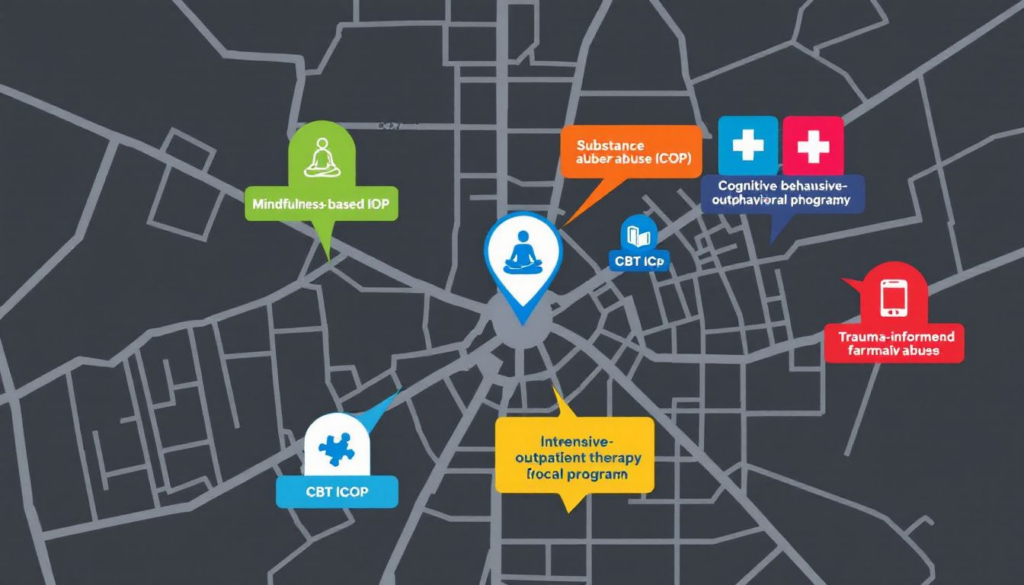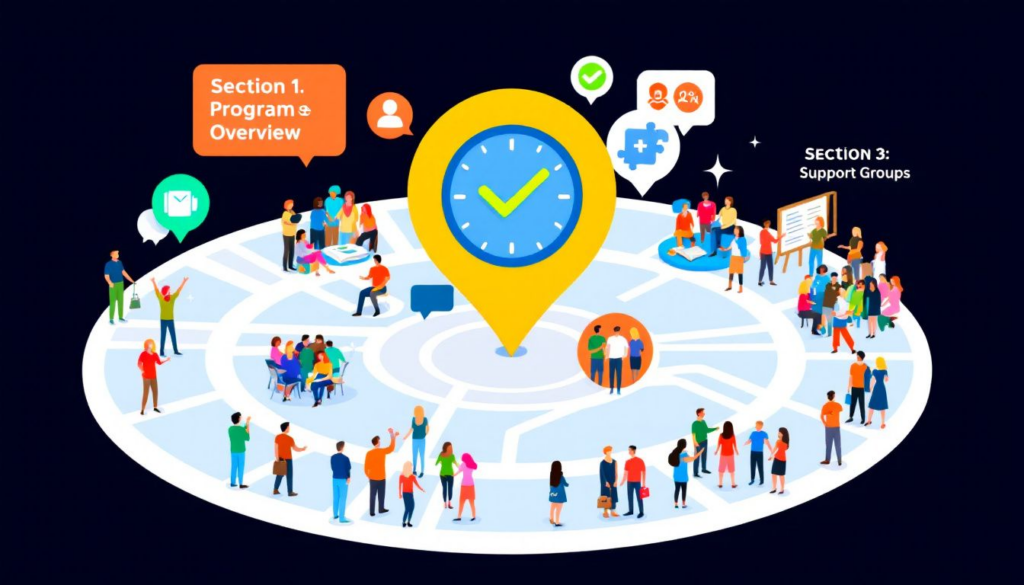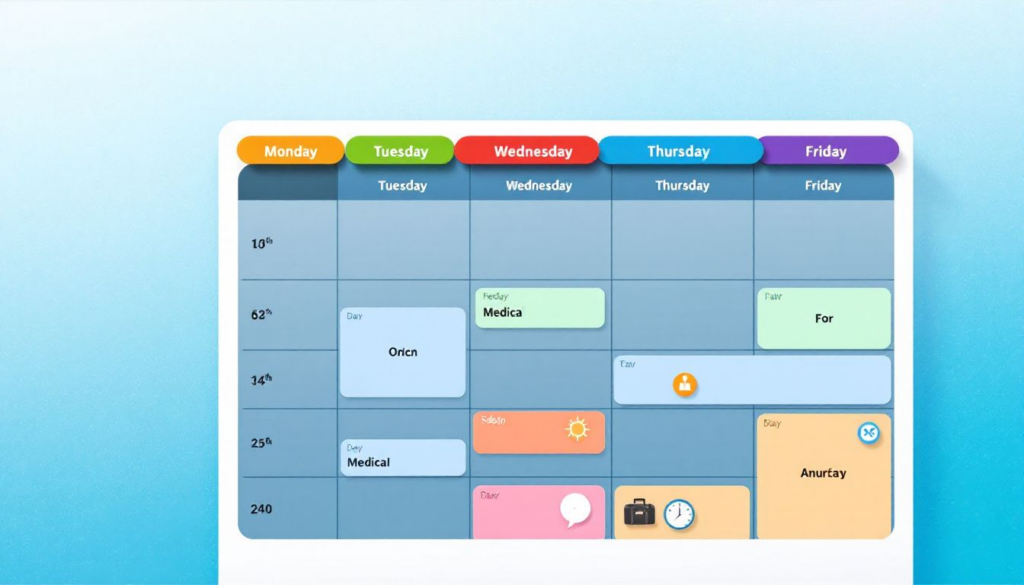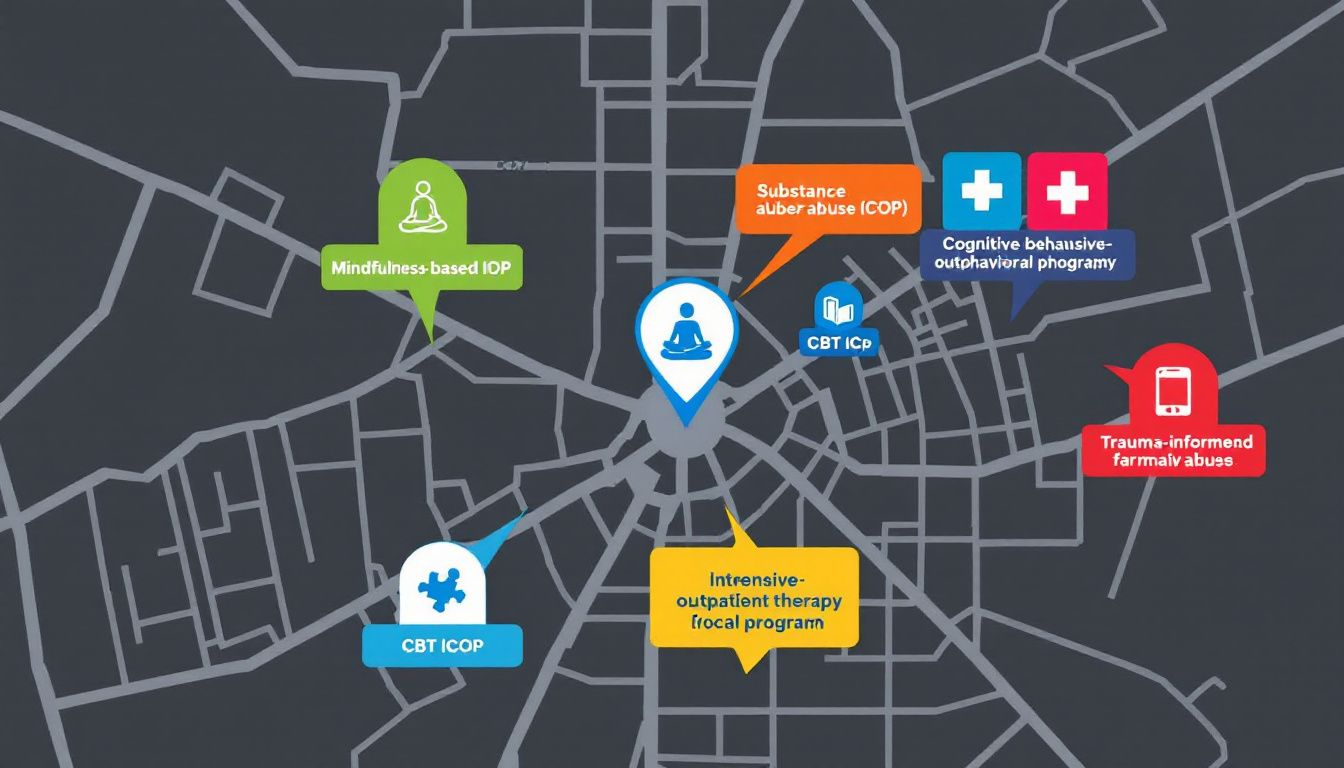Searching for an Intensive Outpatient Program (IOP near me)? This guide will help you find local treatment options, explain what to expect, and offer tips for choosing the best program.
Key Takeaways
- Intensive Outpatient Programs (IOPs) offer structured treatment that allows individuals to maintain their daily responsibilities while receiving intensive care, combining individual and group therapy.
- IOPs differ from other treatment modalities by providing more frequent sessions than standard outpatient therapy and serving as a transitional option for those moving from inpatient care.
- Verifying insurance coverage and considering family support services are important steps in the process of choosing the right IOP, along with evaluating the program’s structure and available therapies.
Finding an Intensive Outpatient Program (IOP)

Identifying a suitable Intensive Outpatient Program (IOP) in your vicinity is an essential initial step on the path to recovery. The United States boasts more than 6,000 centers with IOP offerings, presenting a vast array of treatment options. To find nearby IOPs tailored to your requirements, utilize online tools such as SAMHSA’s directory where inputting your location can simplify the search process. A quick internet search may also reveal numerous local IOP programs.
Soliciting personal recommendations is likewise invaluable. Discussing with friends, family members, or medical professionals who are privy to esteemed treatment facilities can provide insight into top-notch programs delivering quality mental health services and fostering supportive environments for those dealing with substance abuse and mental health challenges.
As you explore various community-based intensive outpatient program iop options locally available consider aspects like how their structure suits your lifestyle needs apart from incorporating therapy varieties which foster reintegration whilst catering peer support. These decision-making factors should blend both digital research findings along with anecdotal accounts. This synthesis ensures that preference-aligned choices surface in pursuit of effective rehabilitation interventions.
For a thorough vetting process assess therapies range staff credentials alongside philosophical underpinnings espoused by prospective centers Adopting this holistic methodology affords the greatest likelihood securing conducive atmosphere essential navigating towards full remission within chosen intensive outpatient program.
What is an Intensive Outpatient Program (IOP)?

An Intensive Outpatient Program, often abbreviated as IOP, is a carefully orchestrated treatment program aimed at individuals who do not need round-the-clock care. Distinct from inpatient treatments, these programs enable participants to reside in their own homes and uphold their everyday tasks while engaging in intensive outpatient treatment. This provides an essential equilibrium for many patients by allowing them to retain normalcy and sustain support networks during their journey toward recovery.
Intensive outpatient programs incorporate both individual therapy sessions and group therapy settings to offer all-encompassing mental health treatment. They typically involve structured environments with evidence-based techniques designed to help patients navigate through challenges effectively. Patients participating in an IOP have the opportunity to learn new coping strategies, better manage psychological symptoms of distress, and recognize potential relapse precipitators.
The execution of such a program usually involves numerous scheduled sessions conducted by professionals like psychiatrists or therapists that may be complemented with leisure activities including yoga or art courses—to bolster the healing process further. Ultimately, Intensive Outpatient Programs aim to empower those involved so they can implement what’s been learned within real-world contexts even as they benefit from continuous expert guidance on their path towards recovery.
Key Differences Between IOP and Other Treatment Levels
Understanding the distinctions among levels of care is essential when considering IOPs. In contrast to standard outpatient therapy that may involve sessions once or twice a week, IOPs necessitate more frequent attendance, often requiring visits multiple times weekly. This increased intensity elevates the level of care offered by IOPs while still foregoing the need for overnight stays.
IOPs differ from partial hospitalization programs (PHP) in terms of treatment concentration. PHP demands near full-day commitment and provides an even higher degree of attention than IOPs. Thus, individuals who require significant support but are keen on keeping up with their everyday commitments might find IOPs a better-suited option.
For those transitioning from inpatient treatment back into regular life routines, IOPs can provide an intermediary step down in care intensity while maintaining substantial supportive services during this critical period, bridging the gap between comprehensive inpatient treatment and less intensive forms of outpatient care.
Types of Therapies Used in IOP Programs

Intensive Outpatient Programs are designed to tackle issues related to both addiction and mental health by deploying a range of evidence-based therapeutic approaches. Such programs typically incorporate different kinds of group therapy, including psychoeducational groups, skills development sessions, process-oriented gatherings, as well as individual counseling.
We will explore the particular types of therapies prevalent in Intensive Outpatient Programs in greater detail. Among these are Cognitive-Behavioral Therapy (CBT) and Motivational Interviewing (MI), along with comprehensive group therapy meetings that play a vital role within this framework.
Cognitive-Behavioral Therapy (CBT)
Many Intensive Outpatient Programs (IOPs) incorporate Cognitive-Behavioral Therapy (CBT) as a central element in their approach, focusing on altering negative thoughts and actions to prevent relapse and promote sustained recovery. Within IOPs, CBT plays a crucial role by enabling individuals to recognize and cope with stimuli associated with substance use and mental health conditions. Its effectiveness lies in the opportunity it provides for participants to apply learned therapeutic strategies while maintaining their usual day-to-day activities.
During CBT sessions, the emphasis is placed on identifying detrimental cognitive patterns and transforming them into positive, beneficial ones. This transformation aids not only in diminishing symptoms related to mental health disorders, but also furnishes patients with actionable tactics for managing stressors that could potentially lead back to old habits.
By weaving CBT techniques into everyday life, those enrolled in such programs are better poised to lay down the groundwork necessary for lasting recovery from various health conditions.
Motivational Interviewing (MI)
Utilizing a technique known as Motivational Interviewing (MI), Intensive Outpatient Programs (IOPs) aim to bolster the client’s drive for change, particularly in relation to their mixed feelings about substance use. By adopting a conversational style that is centered around the client, MI strives to strengthen an individual’s resolve towards engaging with recovery efforts. It navigates through the ambivalence typically associated with addiction and assists clients in identifying their personal incentives for pursuing transformation, thereby reinforcing their commitment to attaining and sustaining abstinence.
Therapists implement strategies such as asking probing questions that require more than yes-or-no answers, practicing reflective listening skills, and offering positive affirmations within MI sessions. These techniques assist individuals in voicing out their desires for life changes. This cooperative method not only boosts confidence among those on the path of recovery, but also instills a deep-rooted sense of responsibility pertaining to one’s own healing process. Consequently, MI has been shown to significantly amplify other treatment modalities’ effectiveness while promoting enduring long-term recovery from addiction.
Group Therapy Sessions
Group therapy serves as an essential element of Intensive Outpatient Programs (IOPs), creating a communal environment where participants can exchange personal stories. This collective setting promotes mutual support, greatly aiding those contending with addiction and mental health challenges.
Active participation in group therapy offers individuals the opportunity to absorb insights from fellow members, develop alternative viewpoints, and establish a supportive network that transcends the confines of their treatment program.
Duration and Schedule of Intensive Outpatient Programs

Intensive Outpatient Programs (IOPs) are structured to offer a balance of thorough care and adaptability in scheduling. IOPs customarily consist of therapy sessions held for three to four hours at a time, frequently taking place between three to five days each week. Each session can last from two to five hours with participants expected to engage in at least nine hours of program services weekly.
The duration of an intensive outpatient program is not fixed. It ranges broadly, Extending over two or three months. Some may extend anywhere from 90 days up to beyond one year, tailored according to the progress and specific needs of the individual attending. The criteria for completing an IOP hinge on personal advancements within the treatment and completion might be reached earlier if considerable improvements are demonstrated.
A principal benefit inherent in IOPs lies in their versatile nature, which permits attendees ongoing involvement with their day-to-day obligations alongside participation in treatment sessions. This aspect proves particularly valuable for individuals seeking robust support without having the capacity for immersion into full-time residential treatment programs.
Assessing If IOP Is Right for You
Determining if an Intensive Outpatient Program (IOP) aligns with your needs involves deliberate analysis and investigation. With a proliferation of over 6,000 IOP facilities throughout the United States, it’s critical to scrutinize a variety of programs to secure one that resonates with you personally. Commence by partaking in a diagnostic evaluation aimed at discerning your specific requirements and tailoring your treatment plan accordingly. A personalized appraisal from the intake staff is instrumental in identifying which method of treatment will be most effective for you.
When sifting through potential programs, factor in whether family support services are provided alongside addiction treatment options. Such services are paramount as they equip relatives with insights into addiction while bolstering them to effectively back up your recovery process.
In evaluating an IOP, delve into details about how long the program runs for, its policy on insurance coverage acceptance as well as its overarching therapeutic principles. Obtaining advice from professionals specializing in primary care or mental health can yield essential perspectives on whether enrolling in an IOP suits your particular situation regarding mental health and recovery progress.
How to Verify Insurance Coverage for IOP
Ensuring that your insurance coverage encompasses an Intensive Outpatient Program (IOP) is a key component of initiating treatment. Engage directly with your insurer to grasp the nuances of what your policy entails. Coverage for IOP services by many insurance plans is common, yet there might be constraints on session counts and prerequisites such as obtaining prior authorization. Several centers offering IOP treatment also extend complimentary services for insurance verification. These establishments include Solution Based Treatment and Apex Recovery Center, which guide you through understanding the specifics of what your plan includes.
To expedite this process when approaching various treatment centers for assistance with an Intensive Outpatient Program (IOP), ensure that you have all relevant information about your insurance readily available. Doing so can streamline access to the program while making certain that financial aid needed for recovery is firmly in place within the contours set forth by both insurers and IOP providers alike.
Preparing for Your First IOP Session
Before embarking on your initial session of the Intensive Outpatient Program (IOP), it is crucial to undertake several key preparations. Following the intake procedure, newcomers typically acquire a Welcome Packet containing vital details regarding their forthcoming program and its commencement date.
Should your IOP entail online sessions, ensuring that all required software applications are installed on your electronic device in advance is critical. Admissions are predominantly arranged for Mondays, which facilitates new entrants beginning with the onset of a treatment module.
To fully benefit from the outset of your Intensive Outpatient Program experience, being well-prepared and knowledgeable is essential.
Long-Term Benefits of IOP Treatment

Participating in an Intensive Outpatient Program (IOP) has demonstrated significant and enduring advantages for those on the journey to recovery. Research supports that ongoing engagement with IOPs contributes positively to long-lasting sobriety, exhibiting a decrease in substance use over time. The establishment of sober living settings is instrumental as they offer consistent support that aligns with the goals of long-term recovery.
Community offerings such as instructional seminars and group gatherings centered around peer support are vital components within the rehabilitation trajectory. These support groups build a collective spirit and emotional strength crucial for persistent abstinence from substances. Local providers of mental health services might present extra therapy choices that effectively enhance IOP interventions, ensuring all-encompassing assistance for individuals pursuing recovery.
Local Resources and Support Groups
Crucial to the success of an intensive outpatient program (IOP) treatment plan is the incorporation of local resources and support groups. Facilities dedicated to sober living are instrumental for individuals in IOP as they foster a conducive environment that supports sustained sobriety while transitioning into addiction-free living. These settings offer not only structure but also continuous support and opportunities for personal accountability.
Peer-driven 12-step programs like Alcoholics Anonymous (AA) and Narcotics Anonymous (NA) serve as essential adjuncts to intensive outpatient program treatment, providing communal solidarity and fellowship crucial to reinforcing the recovery journey.
Engaging with community-based support networks through these groups solidifies a comprehensive safety net that propels individuals towards enduring long-term recovery from addiction.
Summary
Intensive Outpatient Programs (IOPs) provide a comprehensive and flexible approach to addiction and mental health treatment, allowing individuals to receive the care they need while maintaining their daily responsibilities. By understanding what IOPs are, the types of therapies involved, and the long-term benefits they offer, you can make an informed decision about your treatment options. Remember, recovery is a journey, and with the right support and resources, you can achieve lasting sobriety and mental well-being.
Frequently Asked Questions
What is an Intensive Outpatient Program (IOP)?
An Intensive Outpatient Program (IOP) offers a rigorous therapy structure, allowing participants to continue living at home while participating in intensive individual and group therapy sessions several times each week. This method is designed to address mental health issues as well as addiction with efficacy.
How do I find an IOP near me?
To find an IOP near you, utilize online directories like the SAMHSA directory, conduct a Google search, or seek recommendations from trusted friends or healthcare providers.
These methods will help you locate suitable options in your area.
What types of therapies are used in IOPs?
Intensive outpatient programs employ proven, evidence-based therapeutic methods including Cognitive-Behavioral Therapy (CBT), Motivational Interviewing (MI), and group therapy sessions. Such strategies are instrumental in helping participants navigate triggers effectively and cultivate a motivation towards positive transformation.
How long do IOPs typically last?
IOPs typically last between two to three months, with the possibility of extension up to a year based on individual progress.
It is important to participate in sessions multiple times a week for optimal results.
How can I verify my insurance coverage for IOP?
To confirm whether your insurance plan covers an Intensive Outpatient Program (IOP), you can either contact your insurance provider or inquire at the treatment center itself, as a number of these centers offer free services to verify insurance and determine if prior authorization is required.
By taking this step in advance, you’ll gain a clear understanding of what benefits are available to you.

Mitchell Grant Cohen
Dr. Mitchell G. Cohen is a board-certified Internal Medicine specialist with over 34 years of experience in patient-centered healthcare. A graduate of Hahnemann University School of Medicine, Dr. Cohen completed his internship at the University Health Center of Pittsburgh, where he gained invaluable hands-on experience. He is also a certified addiction specialist, holding membership with the American Society of Addiction Medicine (ASAM).
Currently based in Nashua, NH, Dr. Cohen is affiliated with Saint Joseph Hospital, where he provides comprehensive care focusing on both internal medicine and addiction treatment. His expertise includes prevention, diagnosis, and management of adult diseases, as well as specialized care for individuals facing substance use disorders.
Dr. Cohen is committed to fostering open communication, ensuring his patients are fully informed and empowered to make confident decisions about their health and treatment options.





